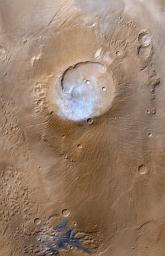
|
Apollinaris Patera, Mars
- Click the image above for a larger view
- Full-Res JPEG (429 x 669) (66.4 kB)
- Full-Res TIFF (429 x 669) (954.3 kB)
Caption:
This month (April 1999), the Mars Global Surveyor Mars Orbiter Camera (MOC) passed over the Apollinaris Patera volcano and captured a patch of bright clouds hanging over its summit in the early martian afternoon. This ancient volcano is located near the equator and--based on observations from the 1970s Viking Orbiters--is thought to be as much as 5 kilometers (3 miles) high. The caldera--the semi-circular crater at the volcano summit--is about 80 kilometers (50 miles) across.
The color in this picture was derived from the MOC red and blue wide angle camera systems and does not represent true color as it would appear to the human eye (that is, if a human were in a position to be orbiting around the red planet). Illumination is from the upper left.
Background Info:
Malin Space Science Systems and the California Institute of Technology built the MOC using spare hardware from the Mars Observer mission. MSSS operates the camera from its facilities in San Diego, CA. The Jet Propulsion Laboratory's Mars Surveyor Operations Project operates the Mars Global Surveyor spacecraft with its industrial partner, Lockheed Martin Astronautics, from facilities in Pasadena, CA and Denver, CO.
Cataloging Keywords:
| Name | Value | Additional Values |
|---|---|---|
| Target | Mars | |
| System | ||
| Target Type | Planet | |
| Mission | Mars Global Surveyor (MGS) | Viking |
| Instrument Host | Mars Global Surveyor | |
| Host Type | Orbiter | |
| Instrument | Mars Orbiter Camera (MOC) | |
| Detector | ||
| Extra Keywords | Color, Crater, Dust, Volcano | |
| Acquisition Date | ||
| Release Date | 2000-06-14 | |
| Date in Caption | ||
| Image Credit | NASA/JPL/MSSS | |
| Source | photojournal.jpl.nasa.gov/catalog/PIA02006 | |
| Identifier | PIA02006 | |
